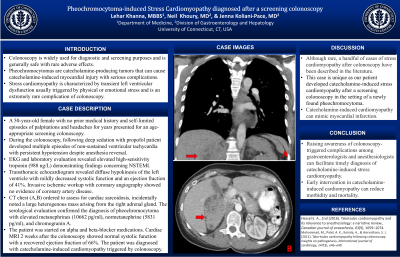Monday Poster Session
Category: General Endoscopy
P2020 - A Unique Case of Pheochromocytoma-Induced Stress Cardiomyopathy Diagnosed After a Screening Colonoscopy
Monday, October 23, 2023
10:30 AM - 4:15 PM PT
Location: Exhibit Hall

Has Audio

Lehar Khanna, MBBS
University of Connecticut
Hartford, CT
Presenting Author(s)
Lehar Khanna, MBBS1, Neil Khoury, MD2, Jenna Koliani-Pace, MD3
1University of Connecticut, Hartford, CT; 2UConn Health, West Hartford, CT; 3Hartford Hospital, Glastonbury, CT
Introduction: Colonoscopy is widely used for diagnostic and screening purposes and is generally safe with rare adverse effects. Pheochromocytomas are catecholamine-producing tumors that can cause catecholamine-induced myocardial injury with serious complications. Stress cardiomyopathy is characterized by transient left ventricular dysfunction usually triggered by physical or emotional stress and is an extremely rare complication of colonoscopy. We present the case of a patient with an undiagnosed pheochromocytoma who developed catecholamine-induced stress cardiomyopathy after a screening colonoscopy with deep sedation.
Case Description/Methods: A 50-year-old female with no prior medical history and self-limited episodes of palpitations and headaches for years presented for an age-appropriate screening colonoscopy. During the colonoscopy, following deep sedation with propofol patient developed multiple episodes of non-sustained ventricular tachycardia with persistent hypotension despite anesthesia reversal. EKG and laboratory evaluation revealed elevated high-sensitivity troponin (988 ng/L) demonstrating findings concerning NSTEMI. A transthoracic echocardiogram revealed diffuse hypokinesis of the left ventricle with mildly decreased systolic function and an ejection fraction of 41%. Invasive ischemic workup with coronary angiography showed no evidence of coronary artery disease. CT chest was ordered to assess for cardiac sarcoidosis, and incidentally noted a large heterogenous mass arising from the right adrenal gland. The serological evaluation confirmed the diagnosis of pheochromocytoma with elevated metanephrines (10662 pg/ml), normetanephrine (5831 pg/ml), and chromogranin A. The patient was started on alpha and beta-blocker medications. Cardiac MRI 2 weeks after the colonoscopy showed normal systolic function with a recovered ejection fraction of 66%. The patient was diagnosed with catecholamine-induced cardiomyopathy triggered by colonoscopy.
Discussion: Although rare, a handful of cases of stress cardiomyopathy after colonoscopy have been described in the literature. Our case is unique as it is the only case described, to our knowledge, diagnosed in the setting of a newly found pheochromocytoma. Catecholamine-induced cardiomyopathy can mimic myocardial infarction and raising awareness of colonoscopy-triggered complications among gastroenterologists and anesthesiologists can facilitate timely diagnosis. Early intervention in catecholamine-induced cardiomyopathy can reduce morbidity and mortality.

Disclosures:
Lehar Khanna, MBBS1, Neil Khoury, MD2, Jenna Koliani-Pace, MD3. P2020 - A Unique Case of Pheochromocytoma-Induced Stress Cardiomyopathy Diagnosed After a Screening Colonoscopy, ACG 2023 Annual Scientific Meeting Abstracts. Vancouver, BC, Canada: American College of Gastroenterology.
1University of Connecticut, Hartford, CT; 2UConn Health, West Hartford, CT; 3Hartford Hospital, Glastonbury, CT
Introduction: Colonoscopy is widely used for diagnostic and screening purposes and is generally safe with rare adverse effects. Pheochromocytomas are catecholamine-producing tumors that can cause catecholamine-induced myocardial injury with serious complications. Stress cardiomyopathy is characterized by transient left ventricular dysfunction usually triggered by physical or emotional stress and is an extremely rare complication of colonoscopy. We present the case of a patient with an undiagnosed pheochromocytoma who developed catecholamine-induced stress cardiomyopathy after a screening colonoscopy with deep sedation.
Case Description/Methods: A 50-year-old female with no prior medical history and self-limited episodes of palpitations and headaches for years presented for an age-appropriate screening colonoscopy. During the colonoscopy, following deep sedation with propofol patient developed multiple episodes of non-sustained ventricular tachycardia with persistent hypotension despite anesthesia reversal. EKG and laboratory evaluation revealed elevated high-sensitivity troponin (988 ng/L) demonstrating findings concerning NSTEMI. A transthoracic echocardiogram revealed diffuse hypokinesis of the left ventricle with mildly decreased systolic function and an ejection fraction of 41%. Invasive ischemic workup with coronary angiography showed no evidence of coronary artery disease. CT chest was ordered to assess for cardiac sarcoidosis, and incidentally noted a large heterogenous mass arising from the right adrenal gland. The serological evaluation confirmed the diagnosis of pheochromocytoma with elevated metanephrines (10662 pg/ml), normetanephrine (5831 pg/ml), and chromogranin A. The patient was started on alpha and beta-blocker medications. Cardiac MRI 2 weeks after the colonoscopy showed normal systolic function with a recovered ejection fraction of 66%. The patient was diagnosed with catecholamine-induced cardiomyopathy triggered by colonoscopy.
Discussion: Although rare, a handful of cases of stress cardiomyopathy after colonoscopy have been described in the literature. Our case is unique as it is the only case described, to our knowledge, diagnosed in the setting of a newly found pheochromocytoma. Catecholamine-induced cardiomyopathy can mimic myocardial infarction and raising awareness of colonoscopy-triggered complications among gastroenterologists and anesthesiologists can facilitate timely diagnosis. Early intervention in catecholamine-induced cardiomyopathy can reduce morbidity and mortality.

Figure: CT Chest with contrast revealing large lobulated pheochromocytoma with cystic and necrotic regions.
Disclosures:
Lehar Khanna indicated no relevant financial relationships.
Neil Khoury indicated no relevant financial relationships.
Jenna Koliani-Pace indicated no relevant financial relationships.
Lehar Khanna, MBBS1, Neil Khoury, MD2, Jenna Koliani-Pace, MD3. P2020 - A Unique Case of Pheochromocytoma-Induced Stress Cardiomyopathy Diagnosed After a Screening Colonoscopy, ACG 2023 Annual Scientific Meeting Abstracts. Vancouver, BC, Canada: American College of Gastroenterology.
